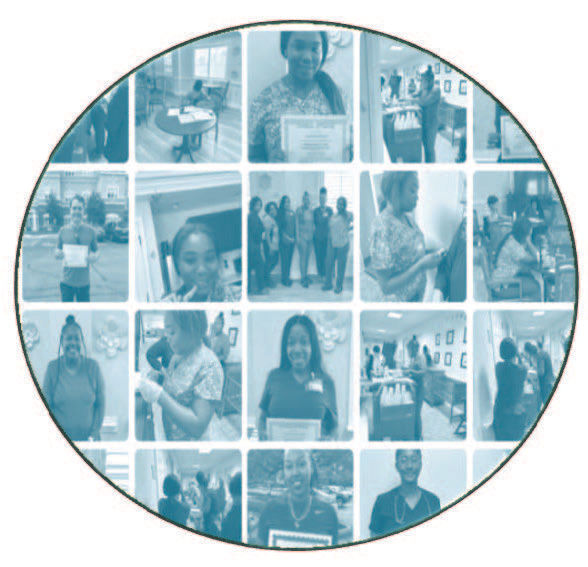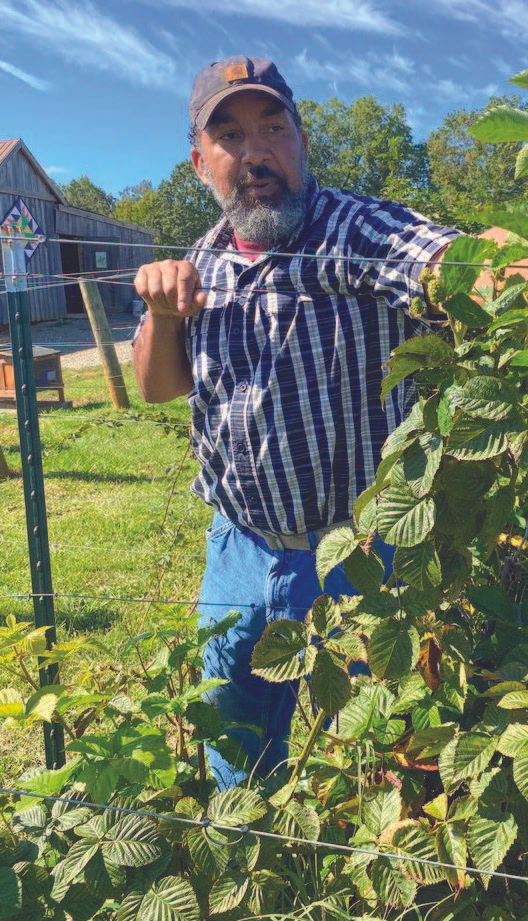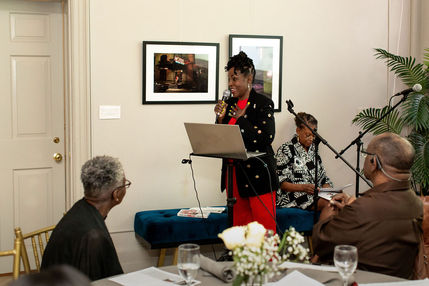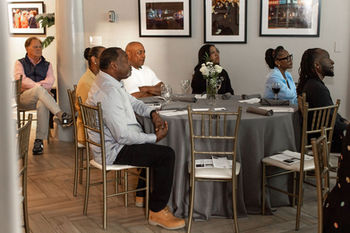GOOD.
A foundation supporting black
ideas for improving black health.

Get Involved
Current Projects

Dr. Rovenia Brock Riggins, who most people know as “Dr. Ro”, is a nationally-known nutritionist, television personality, and author. She hosted the first ever National Health and Fitness Show for women of color “Heart & Soul” on BET and was the network’s medical correspondent.
She is the Nutrition Coach who helped over one and a half million viewers lose more than 6 million pounds on TV and in private practice. She helped actress/comedian, Talk Show Host Sherri Shepherd, lose weight on The View and is the go-to expert for National Media in the Nutrition & Health space.
Since moving to Charlottesville, Dr. Ro has already found ways to contribute her talent to the community. She is the creator, Host/Executive Producer of the New Dr. Ro Morning Show on 101.3 Jamz. She is passionate about helping women and families live healthy, vibrant lives.
PROPOSAL: In addition to continuing her work on the Dr. Ro Morning Show on 101.3 Jamz, where she has the potential to reach thousands of listeners, Dr. Ro is proposing nutrition community outreach with the goal of lifestyle and wellness improvement.
NUTRITION COMMUNITY OUTREACH
Engage two cohorts of 100 participants (families and individuals) over two, six-month periods. Each participant will receive nutrition coaching, and access to additional health information fairs, and other educational health events. Participants to receive an Apple watch or similar device to measure health outcomes (blood pressure, blood sugar, heart rate, etc.). Also, track weight and other outcomes.
METHODOLOGY
Use pre- and post-tests to ascertain nutrition knowledge before and after dissemination of nutrition, lifestyle, and health information distributed via coaching sessions, radio segments, and public speaking to large and small groups. Participants will be tested and re-tested for clinical indicators of desired health outcomes associated with disease prevention and management of: 1) obesity and weight management, 2) Type-2 diabetes, 3) hypertension, 4) heart disease
TARGET HEALTH OUTCOMES OVER 6 MONTHS
-
10% loss of body weight
-
5-10% reduction in blood sugar and blood pressure
-
Improvements in lifestyle habits, including demonstrating an increase in nutrition knowledge and improved lifestyle habits. Eating more vegetables and fruit, eating/drinking fewer empty-calorie foods and beverages, eating fewer ultra-processed foods, reducing sugar, salt, and trans-fats.
-
Increase in physical activity (walking, strength training, yoga, and meditation).
COST: $130,000 ($65,000 per cohort, per 6-month term)
AUDIENCE: Families & Individuals
-

Doris Chatman is owner of Chatmans Flight to Success. She is licensed in health care administration and management and has been training Registered Medication Aides for over 30 years. Her six-week Registered Medication Aide class includes direct care certification and qualifies graduates to work in assistant living facilities preparing and administering medications to residents and supporting the nursing staff with other assigned duties.
Doris doesn’t leave any students behind. She forms relationships with her students and tailors her instruction to accommodate different learning styles. She has a 90% graduation rate, serving her students as teacher, mentor, coach and friend. Upon graduation, her students earn an average $25/hour and Doris’ connections with and reputation at local assistant living facilities opens doors to employment opportunities. Maybe most important is her training opens doors to other health care opportunities. Registered Medication Aides make a living wage and can enter health care in a position not as physically challenging as some entry level health care positions.
Doris’ students say her class changes their lives. The facilities that employ Doris’ Registered Medication Aides say they start
their careers well prepared.
According to the article, “Does it Matter if Your Doctor Looks Like You,” published by the Yale School of Medicine, there are benefits to creating a more diverse health care team: “…studies show a significant association between patient-provider racial/ethnic concordance and the likelihood of patients visiting their provider and higher patient satisfaction scores. These findings offer some insight into prior students showing that racially/ ethnically concordant patient-physician interactions might be associated with patiepreference as well as improved patient outcomes." Does it Matter if Your Doctor Looks Like You? Yale School of Medicine
Chatmans Flight to Success doesn’t train physicians, but what it does offer is an opportunity for people to enter the healthcare field, a field where most positions show underrepresentation of black staff.
PROPOSAL: Provide a pilot program offering free training and support for 20 black students, including training materials, training day meals, and babysitting if needed.
Package includes tutoring and additional support needed on an individual level. Students become part of a cohort that is followed, reengaged and supported in their current career and exposed to other healthcare careers.
COST: $20,000 (allows up to $1,000 per student, based on their individual needs)
AUDIENCE: Black males/females interested in starting or continuing a career in health care

Ebenezer Baptist Church in Charlottesville, Virginia, has developed relationships with local black farmers for several years. Their work with Sarah Morton, Ph.D., at Cattle Run Farms in Ruckersville, Virginia, has brought hundreds of pounds of free-range, antibiotic-free products to the Charlottesville area. Cattle Run Farms is a third-generation, black-owned farm, dedicated to, “bridging the nutritional divide,” About Cattle Run Farm. The cause of the “nutritional divide,” is defined by the Food Revolution Network, as a “Lack of access to healthy food, economic disenfranchisement, insufficient nutritional education, and unequal distribution of tools for preparing healthy meals.” Food Inequality: How Poor Nutrition Affects Health & Wealth. According to the network, “Inequality of access to healthy food both arises from and reinforces class divides, racial inequality, and intergenerational cycles of poverty.” Cattle Run is one of several black-owned farms in the Charlottesville area.

PROPOSAL: We propose hiring a coordinator to connect local black farmers in a network allowing them to work together to provide locally grown food to Charlottesville and surrounding communities. This position will be grant-funded for two years while developing a framework and sustainability plan for this work. The coordinator will work to immediately expand selling options for the farmers, while researching and promoting
collaboration and joint expansion plans.
Ebenezer Baptist Church will be the fiscal sponsor for this effort. They will work with the Move2Health Equity Coalition to
write the job description and the UVA Equity Center on outcome measures.
COST: $150,000 ($75,000/year for two years)

The Birth Sisters of Charlottesville is a group of black doulas expert in addressing disparities in maternal health outcomes in communities of color. Their mission is, “To dismantle
root causes of systemic maternal health disparities for Black, Indigenous, People of Color (BIPOC) while denying race as a risk factor.” Birth Sisters of Charlottesville. They are
nationally known for their work in this space and Charlottesville is fortunate to have them in our community. Yet, with all their expertise and hard work, there is much more to do to
support black maternal health equity.
According to the article, “Racial Disparities in Maternal and Infant Health: Current Status and Efforts to Address Them, published by the Kaiser Family Foundation (KFF) in October 2024, “Stark racial disparities in maternal and infant health in the U.S. have persisted for decades despite continued advancements in medical care.”
The article goes on to say:
Pregnancy-related mortality rates among . . . Black women are over three times higher than the rate for White women. Black . . . women also have higher numbers of preterm births, low birthweight births, or births for which they received late or no prenatal care compared to White women. Infants born to Black . . . people have markedly higher mortality rates than those born to White people.
Differences in health insurance coverage and access to care play a role in driving worse maternal and infant health outcomes for people of color. However, inequities in broader social and economic factors, including income, are primary drivers for maternal and infant health disparities. Moreover, disparities in maternal and infant health persist even when controlling for certain underlying social and economic factors, such as education and income, pointing to the role racism and discrimination
play in driving disparities. Racial Disparities in Maternal and Infant Health: Current Status and Efforts to Address Them | KFF
PROPOSAL: Ongoing operational support
Our Aim
Eko Ise is dedicated to increasing arts engagement for Black youth through a culturally affirming, Afro-centric arts education model. By connecting students with working artists
and fostering creative expression, we provide a transformative space that nurtures identity, empowerment, and artistic excellence.
Our Why
Historical data on SOL scores for Black students across the Commonwealth, including our local divisions Charlottesville City Schools and Albemarle County Public Schools, and low participation in their fine arts program offerings and traditional arts programs reveal a pressing need for alternative, culturally responsive arts education. Many existing programs fail to engage Black youth due to a lack of representation and culturally relevant content. Eko Ise was founded to bridge this gap, ensuring Black students have equitable access to high-quality arts education rooted in their cultural heritage, particularly in the form of scholarships for Black students in low-income communities.
Our Work
Eko Ise launched in 2022 with diverse performance and arts offerings such as drumming, spoken word, hip hop, stage combat. Building on this momentum, Eko Ise is expanding into an after-school program with a museum-school-focused curriculum that emphasizes fine arts, including visual arts, music, and performance. Additionally, the program integrates wellness practices such as mindfulness and meditation, fostering holistic development and well-being. This approach not only cultivates artistic skills but also supports social-emotional learning and academic enrichment.
Funding & Impact
Eko Ise operates on a $20,000 grant that has sustained its initial programming. However, to expand our reach and fully implement the after-school program, additional funding is essential. Support from your foundation will:
• Enable access to instruments, materials, and artist stipends
• Hire high-quality staff
• Expand drumming and performance offerings
• Support youth leadership and mentorship initiatives
• Strengthen partnerships with local museums and schools
Why This Matters
Culturally responsive arts education is a vital tool for equity, mental wellness, and academic success. By investing in Eko Ise, your foundation will directly contribute to the holistic development of Black youth, fostering creativity, confidence, and community empowerment through the arts. We invite you to join us in shaping a future where Black youth have equitable opportunities to explore and excel in the arts.
COST: $25,000/year

THE GOOD FOUNDATION APPROACH
We use a holistic approach. We address social drivers of health by creating, enhancing, developing, and most of all supporting a system of interconnected programs and services to create change on an individual and community level. The framework used is a modified version of one created by Dr. Kirsten Bibbins-Domingo:
Awareness:
Actively listening to the community for both the issues and solutions.
Adjustment:
Recommending and supporting adjustments to address issues.
Assistance:
Supporting organizations and ideas addressing issues on an individual level.
Alignment:
Investing in organizations and ideas creating community-wide change.
Advocacy:
Working to change policies and practices that are barriers to black health.
American Medical Association. Social Determinants of Health: What they are, what they are not. February 2020.
Our approach is data-driven. All organizational and individual support requires outcome measures developed through a partnership with the University of Virginia Equity Center and reported to the community quarterly. Less than 5% of funds raised go to administrative costs.
Our Core Initiatives
The GOOD Foundation raises funds to help provide those opportunities. We support black ideas because we believe the answers to improving black health rests in the many amazing black organizations, churches, community members, and undeveloped ideas of those closest to the issue.
WHAT AFFECTS HEALTH?
EVERYTHING. Health is a state of complete emotional, mental, and physical well-being (World Health Organization). Health is not just whether you have access to a physician. It is about early childhood development,educational opportunities, economic security, employment status, food security, housing, the built environment (parks, sidewalks), social inclusion, nondiscrimination, and more. These are social determinants of health. Taken from AI Definition of Social Determinants of Health.
The GOOD Foundation supports black organizations and ideas in a holistic approach to improving black health.
GOOD.
WHY BLACK HEALTH?
Black people in the city of Charlottesville and elsewhere have poorer health outcomes, more homelessness, fewer opportunities for higher education, and more food insecurity. According to the Orange Dot Report 6.0, “Thirty-seven percent of black families in the city of Charlottesville make less than $35,000 a year, compared to 7% of white families.” Orange Dot Report 6.0. October 2024.
Since the publication of the Orange Dot Report 5.0 in 2022, the percentage of black families making less that $35,000 a year has risen from 32% to 37%. Orange Dot Report 5.0 identified the income gap as “resulting from past and ongoing policies that suppress investment opportunity and wealth creation in Black communities.”
Many people are doing great work to support black health. The GOOD Foundation recognizes we all need to work together to address health inequities. Allies are needed. Collaboration and connectedness will help ensure everyone has the greatest opportunity to be healthy.
Often, well-meaning people go into black communities with what they believe are answers without consulting those impacted. The GOOD Foundation believes those impacted know best, have skills needed to improve health, are already doing great work to improve black health, and given the resources and opportunities of other communities, can do even more.
ABOUT OUR FOUNDER
Jackie Martin was born and raised in Charlottesville, Virginia, and has lived in Charlottesville most of her life. She received a bachelor’s degree from Mary Baldwin University and a master of public health from the University of Virginia. Formerly employed by Sentara Martha Jefferson Hospital for 25 years in various positions, she is currently the Director of Community Partnerships and Health Equity at UVA Health.
Jackie specializes in qualitative research, community engagement, and program development and implementation. She is passionate about reducing health disparities and improving health equity through opportunities and connections to social drivers of health.
She is also passionate about her faith. Developing the Good Foundation is driven by her faith and firsthand observations of the harmful consequences of community solutions developed without community input.

Upcoming Events
Mark your calendar
Help Us Grow
Your contribution makes a huge difference
Donations may be mailed to The GOOD Foundation at the address below, by this PayPal: https://tinyurl.com/mvwfxudj
or by scanning this QR Code



















